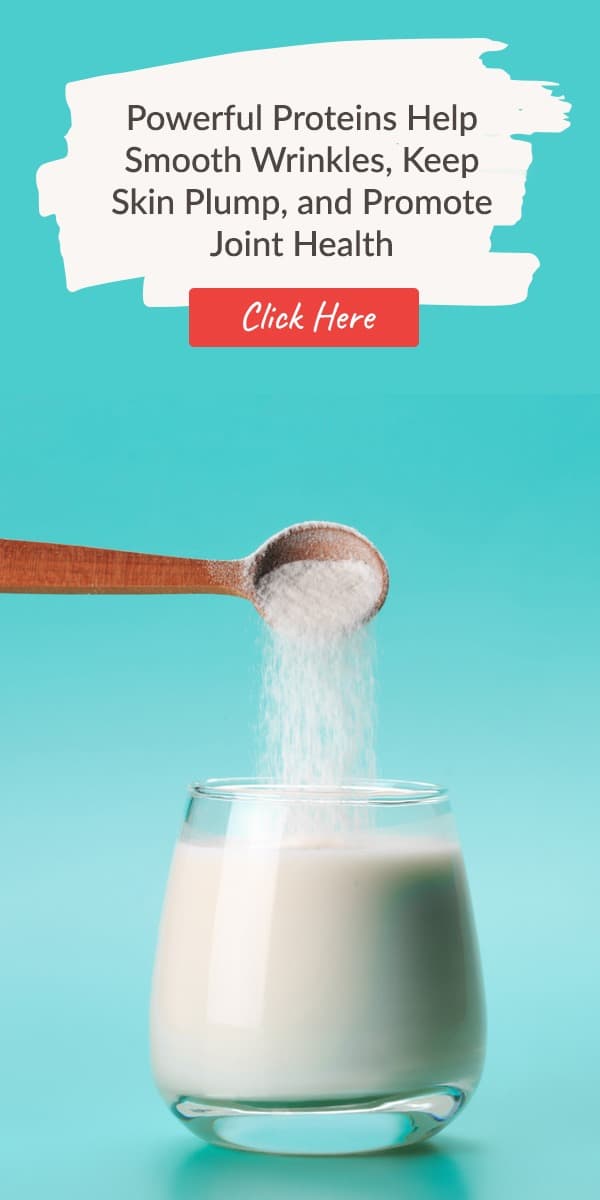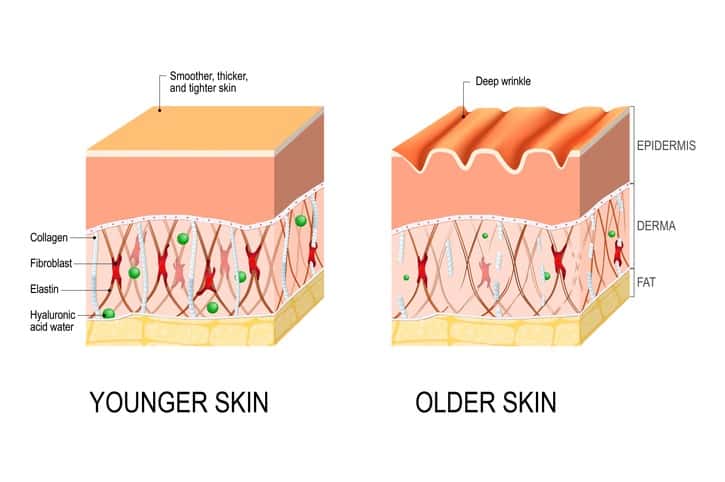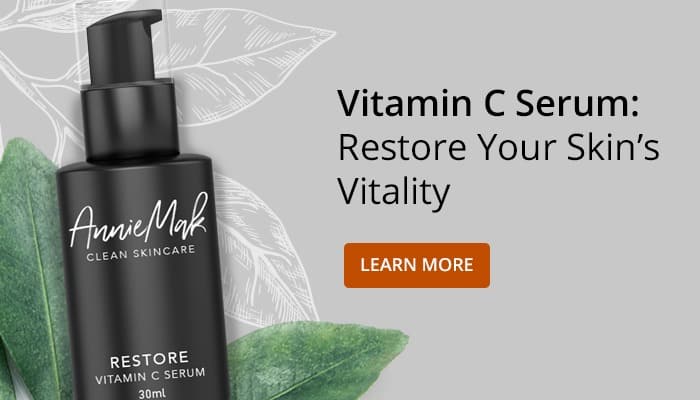Collagen and hyaluronic acid are two of the most popular ingredients found in skin care products. So, can you use collagen serum and hyaluronic acid together?
Many people are curious to know if collagen and hyaluronic acid work well together. After all, they seem to have some overlapping functions when it comes to skincare.
With their unique properties, both collagen and hyaluronic acid supplements can restore important nutrients to your skin while addressing unwanted lines to give you smoother, younger-looking skin.
Do collagen and hyaluronic acid mix well?
Keep reading to find out what the experts say.
What is Hyaluronic Acid?
Hyaluronic acid is an ingredient that has been used in skincare products for years due to its hydrating and restorative properties.
It’s a naturally occurring polysaccharide, which means it’s composed of numerous simple sugars that are bound together, and it can hold up to 1,000 times its weight in water!
This makes hyaluronic acid incredibly hydrating and helpful in drawing moisture into the skin, creating a more youthful look while also providing a protective barrier from environmental damage.
Fun fact: not only beneficial for your skin but a hyaluronic acid supplement has also been used in joint health supplements as it aids in lubrication for fluid movement, helping us stay flexible and reduce joint discomfort associated with age.
What Makes Hyaluronic Acid a Wonder Ingredient?
Hyaluronic acid is a wonder ingredient for skin care, for multiple reasons. It’s light yet highly effective in giving the skin moisture and helping to reduce inflammation and redness.
Its nature as a humectant helps it draw moisture from the environment into your skin, giving you that soft, hydrated texture all day long without feeling oily or greasy.
Hyaluronic acid molecules are a great antioxidant, which means that it works to protect our skin from environmental irritants and pollutants.
All of these attributes come together to make hyaluronic acid a wonder ingredient for your skin.
Who Can Use Hyaluronic Acid?
A hyaluronic acid product is a great way to get smooth, soft, and hydrated skin. The natural molecules of a hyaluronic acid treatment can be used by all genders, ages, and skin barrier.
Whether you have dry skin, oily skin, or combination skin, it’s ideal for incorporating into your skincare routine. Everyone can use hyaluronic acid!
Aging Skin
Unfortunately, our youthful skin doesn’t last forever. Aging skin can experience many different issues, such as wrinkles and sagging.
Fortunately, scientists have discovered a natural remedy that helps to reduce the signs of aging: hyaluronic acid.
It’s a powerful ingredient found in many anti-aging products and is known for its ability to add moisture and elasticity to the skin.
Hyaluronic acid has been used to effectively treat age spots, uneven skin tone, dryness, and dullness in the skin.
Sensitive Skin
If you struggle with sensitive skin, hyaluronic acid helps stimulate skin regeneration, keeping your skin hydrated and radiant. This is important for those with a more sensitive type of skin as it keeps the skin from becoming dry and irritated.
As well as reducing inflammation, hyaluronic acid can help protect the skin from environmental toxins and other sensitivities that may have caused irritation in the past.
Acne-Prone Skin
Hyaluronic acid can be a great addition to your skincare routine if you have acne-prone skin. When applied topically, hyaluronic acid traps moisture in the skin which allows for the replenishment of needed nutrients that keep skin healthy and radiant.
Hyaluronic acid prevents free radical damage, which can make skin more prone to developing imperfections like pimples and blackheads. It also helps improve the healing process of acne breakouts and minimizes scarring.
Young Skin
Hyaluronic acid can be a real boon for young skin because it plays a key role in maintaining skin elasticity and firmness, retaining moisture, reducing inflammation, and boosting skin cell regeneration.
Hyaluronic acid strengthens the skin’s protective barrier to ward off environmental damage, while deeply hydrating dry or rough patches. It works hard to keep your skin young, healthy, and dewy while combating premature skin aging.
What is Collagen?
Collagen is a vital structural protein found throughout the body. It plays an important role in the health and development of skin, ligaments, tendons, bones, and even blood vessels.
Unfortunately, collagen production tends to decline as we age, resulting in wrinkles, sagging, dry skin, and other signs of aging.
Why is Collagen So Important?
Collagen is vital! It has many functions from creating strong bones, joint health, muscle mass, healthy digestive and cardiovascular systems, and skin health, including skin elasticity and more.
What Are the Benefits Of Collagen?
Collagen helps support a strong immune system, healthy skin, strong bones, and joint flexibility.
Also, collagen provides essential amino acids which the body needs for proper metabolism, energy production, and tissue repair.
Best of all, it contains specific peptides which are necessary for heart health and digestion.
Skin Health
Collagen is found in abundance in our skin. Healthy collagen production can lead to suppleness, elasticity, wrinkle reduction, improved hydration, and fewer blemishes.
Not only does it minimize these visible signs, but it can also protect the skin from damage from external factors such as exposure to the sun’s UV rays and free radicals.
Muscle & Bone Strength
Everyone wants to be strong and healthy, and collagen plays a large role in giving us the muscle and bone strength we need to reach our goals.
Collagen helps to increase the production of glycine, which helps strengthen bones and muscles, build cartilage for joint support and provide antioxidant protection for our bodies.
Collagen helps improve circulation throughout the body, with studies showing that it can even reduce inflammation from joint pain or injury.
Supplementing with collagen can help repair tissue damage since it speeds up cell regeneration. There are many amazing benefits to consuming collagen if you’re looking to get stronger bones and muscles!
Hair & Nails
Collagen is essential for healthy, strong hair and nails. It helps promote their growth and development.
Also, collagen contains unique type 1 and type 3 proteins that aid in the repair of damaged hair and nails while encouraging new, healthy growth.
The health benefits of collagen don’t stop there. These same proteins stimulate cells located within the scalp that are responsible for moisturizing and improving the shine of your hair.
Collagen increases keratin production in the fingernails, keeping them from breaking or splintering as easily.
Gut Health
When it comes to gut health, collagen can be incredibly beneficial. Collagen promotes healthy digestion and immune system support.
By helping to repair the intestinal lining, collagen can promote proper nutrient absorption and stimulate better overall gut function.
Experts say that collagen has proven to help with reducing symptoms of digestive distress like leaky gut syndrome and inflammatory bowel diseases.
In supplement form, collagen can help the body maintain the levels of proteins essential for good digestion, and in certain cases, it might even reduce dysbiosis—an imbalance of bacteria that can lead to many gastrointestinal problems.
Similarities Between Collagen Serum & Hyaluronic Acid
Collagen serum and hyaluronic acid are similar in many ways. Both are commonly used to treat skin issues such as wrinkles, dryness, sensitive skin, and age spots.
Collagen serum works to reduce the appearance of wrinkles by restoring elasticity to the skin while hyaluronic acid serum provides deep hydration.
Both promote firmer and smoother-looking skin, making them essential components when it comes to preserving youthfulness.
Both collagen serum and hyaluronic acid serum have the ability to reduce inflammation, improve skin texture and promote the overall health of the skin. They can both be applied directly to the face with a cotton swab or finger and on specific problem areas.
Users can expect refresher, healthier-looking skin while reversing any signs of aging when applied regularly.
Differences Between Collagen Serum & Hyaluronic Acid
We’ve looked at the similarities between collagen serum and hyaluronic acid, but what are the main differences between these two amazing skincare products?
Collagen and hyaluronic acid differ in their makeup, functions, and effects on the skin.
Also, collagen is a protein made up of amino acids that help support the skin’s structure. This type of serum helps plump and firm the skin, reducing signs of aging like wrinkles.
Hyaluronic acid serum is often used to revitalize the skin. It works by retaining moisture, helping keep the skin hydrated, which can reduce puffiness and the appearance of wrinkles.
While they both offer remarkable benefits to your skincare routine, it’s important to consider what type of outcomes you’re aiming for before choosing one or the other (or both!).
Can You Use Collagen Serum and Hyaluronic Acid Together?
Increasingly, people are taking advantage of the power of combining collagen serum and hyaluronic acid for their skincare routine, creating a synergistic effect that can result in powerful anti-aging benefits.
So, whether you’re looking for a way to maintain your youthful appearance or need an extra bit of help minimizing damage due to age or overexposure to the sun, consider combining collagen serum with hyaluronic acid for long-lasting results that will leave you looking better than ever!
Can Hyaluronic Acid Replace Collagen Fillers?
One of the latest trends in skincare and anti-aging is the use of hyaluronic acid to achieve plump, youthful-looking skin.
This has made researchers consider whether it can be used as an alternative to collagen fillers, which are usually injected into specific areas of the face to add volume and improve wrinkles.
Although hyaluronic acid works differently from injectable collagen fillers, research suggests that it could offer some comparable results since its hydrating properties can keep the skin feeling smooth and looking more radiant while encouraging natural collagen production.
Ultimately, your best choice may depend on your preference—a quick procedure with temporary effects or a more gradual process with longer-lasting benefits.
The Final Say
So, can you use collagen serum and hyaluronic acid together? Yes, you absolutely can. In fact, using collagen serum alongside hyaluronic acid serum brings out the best benefits of both of these amazing skincare products!
Be sure to head over to our product page for the best options for your skincare routine. For more skincare tips and information, you’ll find great resources at our Health and Anti-Aging BLOG.
Organixx Clean Sourced Collagens blend contains five types of collagen from four sources. What’s more, it’s combined with targeted nutrients such as zinc, vitamin C, and vitamin B6 which specifically enhance the bioavailability and potency of collagen. Clean Sourced Collagens is formulated from the ground up to enhance and support your body’s natural ability to heal and rebuild itself from the INSIDE out.

Organixx Clean Sourced Collagens blend contains five types of collagen from four sources. What’s more, it’s combined with targeted nutrients such as zinc, vitamin C, and vitamin B6 which specifically enhance the bioavailability and potency of collagen. Clean Sourced Collagens is formulated from the ground up to enhance and support your body’s natural ability to heal and rebuild itself from the INSIDE out.

Everyone’s heard about collagen and hyaluronic acid for skincare. But have you ever considered taking collagen with hyaluronic acid as part of your daily routine?
With the number of collagen products on the market today that specifically advertises collagen with added hyaluronic acid, it’s understandable why one might be curious.
In this article, we’ll dive into whether collagen with hyaluronic acid is right for you and what benefits you can get from taking both of these together.
What is Hyaluronic Acid, Exactly?
Hyaluronic acid is a natural molecule found in your body, primarily in the skin, and it plays an important role in maintaining moisture and elasticity.
You can think of hyaluronic acid as being like a water magnet. It draws moisture into itself and helps to retain that moisture within the skin cells. This helps keep your skin hydrated, plump, and youthful looking.
Hyaluronic acid is also known to aid in wound healing, tissue repair, and collagen formation which further contributes to the maintenance of a healthy, glowing complexion.
Why You Need Hyaluronic Acid
Hyaluronic acid is naturally produced and found in the fluids that lubricate and cushion our joints. It’s critical for maintaining healthy joints and providing cushioning for our bones.
It’s a key component of skin tissue and one of the main reasons why our skin looks healthy, smooth, and plump.
Hyaluronic acid delivers nutrients to our tissues, helping with wound healing and regeneration. Hyaluronic acid has anti-inflammatory properties to keep our bodies functioning optimally.
Given all of these incredible benefits, you can understand why hyaluronic acid is so necessary for us.
Hyaluronic Acid and Skin Aging
Hyaluronic acid is a popular component in skin care products due to its amazing ability to delay the effects of aging. Hyaluronic acid works by helping skin cells draw and retain moisture.
By locking in water and forming a protective film over the surface of the skin, hyaluronic acid helps keep the skin looking firm and supple for longer.
It also plays an important role in stimulating the production of collagen, which is necessary for skin health, healthy hair, and well, the mobility and functioning of our body.
As we age, the amount of hyaluronic acid in our skin begins to decrease. By replenishing our hyaluronic acid levels, we are able to slow down the visible signs of aging.
Hyaluronic Acid and Acne
Hyaluronic acid has been gaining lots of attention lately as a treatment for acne. Hyaluronic acid works to reduce the appearance of scars left over from drying out active acne.
What makes it so special is its ability to hold up to 1000 times its weight in water, providing the skin with intense and lasting hydration. This extra moisture helps clear out clogged pores that are susceptible to breakouts!
Regular use of hyaluronic acid has proven to reduce breakouts by providing intense moisture deep into the epidermal layers of the skin.
Hyaluronic acid offers properties that help reduce oil production, making it less likely that acne will become worse over time.
Hyaluronic acid helps promote collagen production which can help fill in any gaps left behind on the surface of your skin, further improving the look of pockmarks from old acne spots. This anti-aging ingredient is definitely something worth trying out if you’re dealing with persistent breakouts!
Is it Good to Use Hyaluronic Acid?
Hyaluronic acid is a great choice for those interested in maintaining or improving their skin health. It can be used to supplement the body’s own production of hyaluronic acid when it begins to slow down. A natural occurrence in our 40s.
Hyaluronic acid’s unique molecular structure allows it to work as an intensive moisturizer while also soothing inflammation.
The use of hyaluronic acid helps stimulate the production of collagen and elastin, which are important for overall skin health as well as for creating firmness and avoiding wrinkles.
By incorporating this clinically proven safe and effective natural substance into your skincare regimen you can enjoy many benefits!
How Can I Take Hyaluronic Acid?
If you’re looking to try taking hyaluronic acid, either through a supplement or as part of your regular beauty routine, there are a few different forms it can come in.
Most commonly you’ll find it as a pill or serum, which is the easiest and most direct way to incorporate it into your beauty regimen.
However, you can also find a hyaluronic acid powder if that suits you better. These dietary supplements are easy to find and even easier to add to your daily regime.
If using a serum, you can apply it topically once or twice daily as directed by instructions on the product packaging.
No matter which forms of hyaluronic acid you take, its anti-aging properties make it an essential addition to any skincare routine!
Why Should You Take Hyaluronic Acid With Collagen?
Collagen is one of the most important proteins in your body, playing an essential role in the health and maintenance of your skin, bones, joints, and connective tissue.
Taking hyaluronic acid with collagen can help supplement the reduced levels of both substances over time, providing multiple benefits for our bodies.
Hyaluronic acid works to lock in moisture within tissues so that our skin remains hydrated and supple while collagen supports elasticity, creating a more youthful look. Combining the two is like a daily multivitamin for your body.
Supplementing with collagen hyaluronic acid can help support joint comfort and mobility, reduce wrinkles, encourage radiant-looking skin, promote healthy blood vessels, support strong healthy nails and healthy hair and enhance overall immunity supporting our health for years to come!
How We Select Supplements
It can often be challenging to decide which supplement is the best for you. It’s important to do your due diligence to help you understand what to look for in a quality supplement.
Determine your specific goals and read up on the available products so you can make an educated decision on what best suits your individual needs. You should also decide which type of supplement will best fit your lifestyle.
Taking time to assess what will benefit you most and remembering your goal will ensure you end up with the product that is ideal for you.
Orally Ingested Or Topical?
The benefits of collagen and hyaluronic acid can vary depending on whether they are administered orally or applied topically. When combined you get collagen hyaluronic acid supplements which improve your health on the outside as well as the inside.
When taking these ingredients orally, the body finds and absorbs them easier because it is broken down into smaller components, providing nourishment to the entire body systems—this often being helpful for joint pain relief, brain function, muscle soreness, and antioxidant protection against oxidative damage while promoting skin health and healthy hair.
Topical applications are better for more localized areas such as facial wrinkles or age spots. For these specific cases, a concentrated formula helps more than ingesting a supplement in order to target these concerns directly.
What to Look For in a Collagen Supplement
When choosing a collagen supplement, there are a few key criteria to consider. The most important ingredients to look for are vitamin C, collagen peptides, and amino acids—all of which will help replenish your body’s collagen production.
Most collagen supplements are made up of either bovine collagen peptides or marine peptides. These vital proteins, collagen peptides are an essential ingredient in supplements to boost the many benefits within.
The most popular collagen types are Type I, Type II, Type III and Type IV. Make sure to read the labels to understand what collagen type or collagen types make up the supplement to know what exactly the collagen peptides are targeting—skin, bones, joints, digestive, etc.
More and more people are choosing a combination collagen hyaluronic acid supplement to powerfully enhance the health benefits of these stand-alone supplements.
Form
When it comes to forms of collagen supplements, there are several options available to suit various needs.
Some common supplement forms include:
- collagen powder,
- capsules,
- gummies,
- tablets,
- liquid,
- oils,
- topical creams,
- and serums.
Depending on your preferences and lifestyle, some might make more sense for you than others.
Although collagen powder is probably the most popular form, whatever your preference is, you’re sure to experience results.
Ingredients & Potential Interactions
While collagen supplements can be incredibly beneficial to your diet and overall health, it’s important to understand the key ingredients and any potential interactions that could come with them.
Collagen supplements are typically composed of either marine or bovine collagen peptides, amino acids such as glycine, lysine, and proline, other minerals like magnesium and calcium, vitamin C and vitamin E, plus plant extracts like turmeric or green tea.
While these ingredients are all likely safe on their own, there is potential for interactions if you’re taking other medications.
As an example, marine collagen can have adverse reactions when taken alongside anticoagulant drugs like warfarin. It can increase the effects of the drug and therefore lead to unwanted side effects such as excessive bruising and bleeding.
Make sure to always check the label for any potential interactions before committing to taking any supplement!
When Should I Talk to My Healthcare Provider About Hyaluronic Acid?
If you are considering taking a supplement or trying an over-the-counter product that contains hyaluronic acid, it is important to talk with your healthcare provider.
Although hyaluronic acid is generally safe, some people should avoid it or take special precautions when using it such as women who are pregnant or planning to become pregnant.
Your healthcare provider will assess the potential risk of any adverse reaction between hyaluronic acid and any other medications you are taking.
The Bottom Line
After reading this article, you should have a pretty good understanding as to why taking collagen with hyaluronic acid is an excellent option for looking and feeling your best! Together, collagen and hyaluronic acid are very effective!
For more great health tips and information, be sure to check out our Health and Nutrition BLOG. And do you want to make sure you are getting the best supplements for your health investment?
Head on over to our product page where you can be assured you’re getting the best quality supplements available on the market today.
Organixx Clean Sourced Collagens blend contains five types of collagen from four sources. What’s more, it’s combined with targeted nutrients such as zinc, vitamin C, and vitamin B6 which specifically enhance the bioavailability and potency of collagen. Clean Sourced Collagens is formulated from the ground up to enhance and support your body’s natural ability to heal and rebuild itself from the INSIDE out.

Nothing beats the substances and mechanisms that exist naturally in your own body for creating health and vitality. That being said, the next best thing is substances found in nature, such as phytonutrient-rich foods, herbs, and spices, that can support your body in similar ways. This is the case with Cassia angustifolia (aka senna) and skin health.
According to many experts, senna’s ability to mimic naturally occurring hyaluronic acid is safer and outperforms synthetically produced hyaluronic acid. That means it can be an amazing addition to your skincare routine, either solo or as a key ingredient in a quality skin-enhancing serum.
What Is Hyaluronic Acid?
Hyaluronic acid is a substance that the body produces which acts like a lubricant and a “moisture capturer.” It has a cushion-like effect between tissues and is found in the highest quantities in the joints and eyes. Research indicates that hyaluronic acid may play an important role in wound-healing as well [1].

Hyaluronic acid is also vital for the health of your skin since it is the molecular substance that helps skin retain moisture. High water content is what makes your skin resilient and pliable. Hyaluronic acid functions in the various layers of skin in different ways. It all adds up to one thing, however – giving your skin that plump glow of youth by helping it retain water [2].
Hyaluronic Acid Depletes As We Age
Just like collagen (another substance vital for skin health), hyaluronic acid gets depleted through external stressors such as:
- too much sun exposure
- environmental pollution
It also responds to internal stressors such as:
- unhealthy eating habits
- lack of sleep
The simple process of aging also has a detrimental effect on hyaluronic acid levels as time goes by.
The authors of a 2012 report for the journal Dermato Endocrinology describe how the process of on-going exposure to stressors as we age affect the skin’s important ability to retain water through hyaluronic acid [3]:
“Skin aging is a multifactorial process consisting of two distinct and independent mechanisms: intrinsic and extrinsic aging. Youthful skin retains its turgor, resilience and pliability, among others, due to its high content of water. Daily external injury, in addition to the normal process of aging, causes loss of moisture. The key molecule involved in skin moisture is hyaluronic acid (HA) that has unique capacity in retaining water.”

Externally Produced Hyaluronic Acid Sources: What You Need to Know
When our bodies lack hyaluronic acid or it is low, skin can become dry, dull-looking, saggy, and prone to skin infection and blemishes. It makes sense then that we would seek out external sources of hyaluronic acid directly, although this may not be optimal for everyone.
Most commercial moisturizers and other face lotions contain externally produced or harvested sources of hyaluronic acid, sometimes from questionable sources. For the most part, external hyaluronic acid is obtained in one of two ways:

- It can be extracted from animals – rooster comb or cows’ eyes, in particular.
- It can also be created artificially in the laboratory by harvesting it from Streptococcus bacteria typically grown on wheat grains [4].
Some people call externally obtained hyaluronic acid a “fountain of youth” since it is able to mimic internally produced hyaluronic acid enough to help the skin retain water.
Indeed, externally produced hyaluronic acid is used commonly in the conventional setting for joint and eye conditions. It is also used for skin conditions, such as for cases of severe, acute dermatitis [5] as well as in many skincare products aimed at combatting signs of aging.
Many people prefer not to use externally produced forms of hyaluronic acid for a variety of reasons. For example, vegans or people concerned about toxicity over the long term.
How the EWG Rates Hyaluronic Acid’s Safety
The much-respected consumer safety organization Environmental Working Group (EWG) gives hyaluronic acid an overall toxicity rating of “fair.” They cite data gaps in research as well as some studies that may indicate the potential for toxicity as the basis for their rating [6].
As with so many other substances that are put in commercial skincare products, very little research has been done on hyaluronic acid. Therefore, we can only speculate as to its safety overall. We can, however, use common sense.
GMO & Antibiotics Are a Concern

Commercial poultry operations and beef feedlots themselves are sadly some of the most toxic environments on the planet. The majority of commercial operations give the animals feed made from GMO-derived corn and soy [7]. In addition, the majority of antibiotics used in the United States – 80% according to recent reports – go to animals used in commercial meat production [8].
Externally derived hyaluronic acid may also contain a yet-unknown potential for toxicity. Think of it this way. Do you really want to put something on your face that was extracted from GMO-raised, heavily medicated animals or grown using one of the most insidiously pathogenic bacteria on earth?
By the way, Streptococci bacteria is responsible for many conditions including strep throat, scarlet fever, inflammation of the kidney, rheumatic fever, impetigo, and cellulitis [9-11].
A Plant-based Alternative to Hyaluronic Acid
Luckily, there is another way. If you’re someone who appreciates plant-based natural alternatives, then you should know about Cassia angustifolia, otherwise known as senna plant. In fact, using Cassia angustifolia seed polysaccharide may yield a better result for your skin health overall.
Cassia Angustifolia Seed Polysaccharide: Amazing Natural Substance for Skin!
Many individuals swear by facial beauty products that contain senna, or Cassia angustifolia – and for good reason.
Senna is originally from Africa and Arabia, although it is now grown all over the world. It has been used for thousands of years for its diuretic effects and especially as a curative for constipation. In modern times, it was discovered that it could also be used as a powerful beauty aid for the skin [12].
Senna’s molecular structure is very similar to hyaluronic acid. This means that it also has the ability to retain water. Senna seed polysaccharides, a natural ingredient in most quality, organic skincare products such as Organixx Skin Restore Vitamin C Serum, has two great effects:
- It creates a barrier on the skin which locks in moisture.
- It also “binds” water to it.

Some experts claim that senna seed can hold up to 100 times its weight in water! A comprehensive 2006 evaluation of Cassia angustifolia seed published in the journal Pharmaceutical Biology confirmed the water-soluble nature of the polysaccharides in the seeds as well as its ability to retain water [13].
Senna is also a powerful antibacterial/antifungal that may be able to help with skin infections. A 2016 report published in the Journal of Pharmacognosy and Phytotherapy stated that Cassia Angustifolia extract “possesses remarkable antimicrobial activity and could act as an antifungal agent [14].”
How Cassia Angustifolia Seed Polysaccharides and Vitamin C Work Together
Cassia angustifolia seed polysaccharides draw moisture to the surface and keep it there for vibrant-looking skin. Vitamin C is the other side of this “dynamic duo.” The C is absolutely vital for the production of collagen in the dermis level.
Likewise, collagen is absolutely essential for skin cell renewal and repair. It is, in fact, what the skin is made up of in large part. It also plays a role in keeping skin soft, firm, and hydrated since it works together with hyaluronic acid to maintain a moist environment.
Skin hydration is important not just for beauty but for the integrity of the skin at a very basic level. Collagen requires a moist environment to stretch. When conditions are too dry, collagen strands will break and new tissue cannot form nor be repaired [15].
Organixx Skin Restore Vitamin C Serum with Cassia Angustifolia
Super-absorbable and high-antioxidant vitamin C is the key ingredient in Organixx Skin Restore Vitamin C Serum. Other 100% organic ingredients included in our unique formula are just as vital, however.
Besides Cassia angustifolia seed polysaccharides, other healing substances in Restore include natural aloe, vitamin E, kelp, Matrixyl® 3000 (a powerful peptide promoter), and MSM. Each ingredient lends its “unique talents” to the mix. Most importantly, they all contribute to a synergistic effect that can lead to beautiful, glowing, moisture-locked skin!
Discover Restore Vitamin C Serum… the most scientifically advanced topical vitamin C on earth, designed to keep your skin youthful, radiant, and healthy for the long term!



